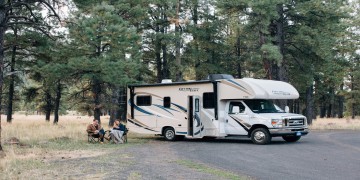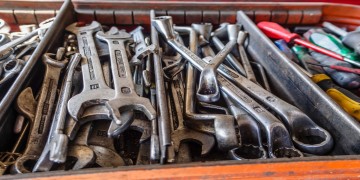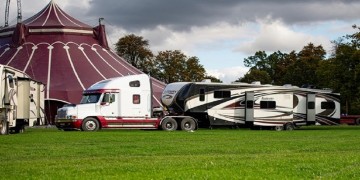Name of Blog
RV Tips Blog
Camping Tips Blog

How to Stay Energy Efficient on the Road
06-18-2018Author :Carrie Todd in RV Repairs / Maintenance / Upgrades
The freedom of the open road is often a bit pricey. Plus, with fluctuating fuel prices, it is often difficult to predict just how expensive a trip might be. Primarily because of the size and weight of the vehicle, this burden is almost inherently born more heavily by those in RVs than drivers of other vehicles. Fortunately, frequent travelers are often experts at minimizing these costs. They have researched their options to ensure they are making the best choices possible when it comes to conserving energy. They have likely discovered some of the top tips for using less when parked, as well as while driving. Seasoned drivers, though, realize that there is always more to learn, and that anyone can benefit from a few new tricks. Here are some tips to becoming more energy-efficient on the road.
Related Read: Budget & Expenses as a Full-Time RVer
Spend Less on Heating and Cooling
Maintaining comfortable conditions inside the RV regardless of the outdoor temperatures arguably uses more energy than nearly anything else when stationary. Fortunately, there are many ways to reduce expenses and energy-use and still enjoy your home.
Begin by parking in a way that optimizes whether or not the heat of the sun will warm the space. During a cold winter or a stay in a cooler climate, place your largest windows on the south or west side. If you are trying to keep things cool during a hot spell, keep the largest windows facing north or east.
You can further improve the heating/cooling efficiency by how you use your windows. If you want to remove heat from a space, open the windows in the evening while it's cool outside and then shut them before noon to trap the cool air inside. Then shut the shades. During cold days, consider opening the shades to let the sun in for warmth, but be sure to keep shades drawn at night and whenever it's overcast.
With just a bit of effort, adding insulation in an RV can greatly improve its energy efficiency. Foam of varying types added to the cargo space and the inside of cabinets keeps the internal conditions climate-controlled. An easier option is to install insulating shades at the windows and heavy drapes at the doorway to reduce drafts.
Related Read: DIY: Installing Insulating Blinds in Your RV
Switch to More Efficient Lights and Appliances
There are many options—including solar—for technical upgrades when it comes to electrical lights and appliances. One of the simplest ways, however, is to switch to LED. They often last as much as 10-times longer than other options. Plus, not only do LED lights, themselves use less energy, they are also cooler than florescent or incandescent. That means that it takes less energy to cool the interior of the RV when using them, as well. Replacing current television sets with newer LED options is another way to improve your energy consumption. Innovations in technology make these sets increasingly more efficient and less expensive.
Related Read: The Benefits of LED Lighting for Your Coach
Another option is to use battery-operated lights and appliances. From coffee makers to power tools, nearly every appliance has a battery-operated version. When rechargeable cells are used, this can be quite economical, as well.
The most energy efficient method, however, is using non-electrical alternatives. For example, open the window shades and use natural sunlight during the day and then let lanterns illuminate the evening. Go outside and enjoy a campfire. This is a great nighttime light source, and it also provides an energy-efficient method for cooking. Since one of the fastest ways to heat your residence in the summer is by using the stove for cooking, this enables you to reduce the amount of energy you use cooling it.
Plan Trips for Maximum Fuel Efficiency
Although it may sound counterintuitive for those who love to travel, one of the best ways to reduce fuel use is by driving less. So, you should carefully plan trips in order to eliminate any extra driving. Consider choosing destinations closer to your current location, and staying longer at each one.
Plot the course to use the most efficient routes. This enables you to avoid using more fuel than necessary. Plus, you can identify the least-expensive fueling stations that are on your way. All of which helps you stay energy-efficient on the road.
Improve Fuel Efficiency by Reducing the Weight
In addition to simply using less fuel, there are several ways to overall improve the RV's mileage. First, reduce the vehicle's weight. Begin by minimizing possessions. Take time to figure out what is necessary to keep during your travels and what is expendable. Anything that isn't needed—or really wanted—should be removed. Donate or sell whatever you can; packing it in the cargo spaces or closets merely increases the overall weight.
Second, if you drive a motorhome, consider what type of vehicle you plan to tow, as that also adds to the drag of the RV and affects the mileage. Compare the weight of different tow vehicles and research their fuel efficiency, as well. Smaller, more efficient vehicles like a Smart car, Vespa, or bicycle are good additions that weigh little.
Third, dumping your waste water and using most of your fresh water before traveling—unless you intend to dry-camp—ensures you aren't carrying any more weight than you have to.
Improve Fuel Efficiency by Keeping the RV Maintained
Next, ensure that your RV is always well-maintained and the tires are properly inflated. Stay on top of oil changes and transmission servicing to improve fuel-efficiency, as well as reduce the need for costly repairs. Keeping tires at the correct pressure and changed on schedule—around every seven years—can improve the mileage by over 3.3-percent.
In Conclusion
Pack light, keep your rig maintained, and be mindful of how much energy you're using when parked. Consider adjusting how you drive. Slow down, especially when going up hills. It reduces wear on the vehicles, and requires far less fuel. Not only is it safer to drive at a reduced speed, it allows you to enjoy the view, as well as the ride.
Think outside the box and keep learning new methods of achieving maximum energy-efficiency. With a little effort and ingenuity, you can reduce expenses while limiting your impact on the environment.
Comment

Author : Carrie Todd
Initially, Carrie became a freelance writer, editor, and artist to support herself doing something she loves that also allows her to travel. Living in her Tourmaster coach, she has spent no more than five months in one place since October 2013. This ensures that she gets to experience the constantly changing scenery that accompanies the yearly seasonal changes, as well as meet new people across the country. She has since become a LuLaRoe Independent Fashion Consultant, as well to further this endeavor. In fact, Carrie considers herself fortunate, as most people have to be of retirement age to enjoy the sort of freedom she has, with every day bringing something different.
Related Blogs

A Guide to RV Sewer Pipe Fittings
It is not a common subject of conversation over the campfire to discuss how to hook up your sewage line or how to empty your black tank. Indeed, it's a dirty job, but someone needs to do it. Indeed, changing RV sewer pipe fittings i...

Renovating an Old RV or Buying a New One - Things to Consider
If you enjoy the RV life but believe that your current RV is no longer up to the task, it's natural to wonder whether you should purchase a new one or repair it. Making such a choice is difficult. On the one hand, you have a vehi...

Does My RV Roof need a Bed Liner?
If you love RVing, then you must know the importance of a good and sturdy RV roof and why it needs proper maintenance. Without a properly maintained RV roof, then all sorts of things can happen. Think of the RV roof as you would the roo...




